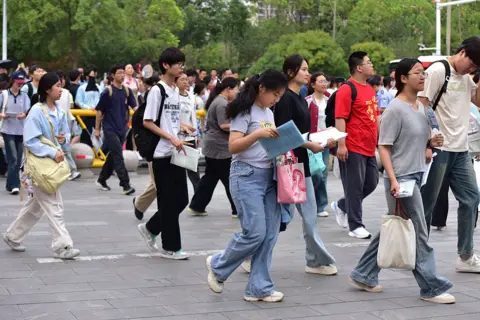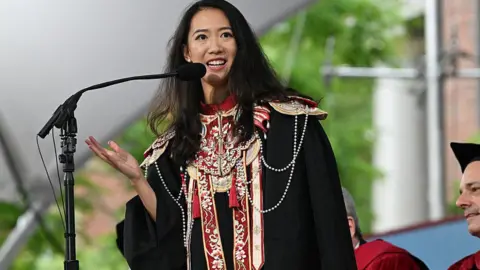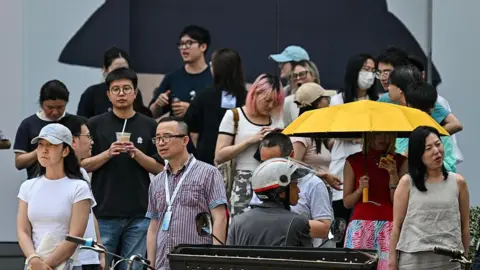
 Getty Images
Getty ImagesThis was supposed to be a breakout year for Chinese actress Nashi, with major roles in two blockbuster films and a highly anticipated TV drama.
But then in June, the 35-year-old’s star crashed as a furore over her exam scores from more than a decade ago sparked a backlash online – and eventually an official investigation into her academic record.
The fallout was immediate. Her name was scrubbed from the credits of the drama, Lychees in Chang’an, and brands began cutting ties.
She joins a growing list of people facing intense scrutiny in China over their privilege, with authorities launching investigations to appease public anger.
In recent months, these viral scandals have hit two actresses, a Harvard graduate, and a doctor from a top Beijing hospital: all young women. They were accused of leveraging family connections to gain unfair advantage.
“There’s privilege every year, but this year there’s more than ever,” says one user on Weibo. Another wrote: “I would love to see more scandals like this. They are truly eye-opening.”
Frustrated with rising unemployment and a slowing economy, more and more young Chinese people feel that connections, or guanxi, pay off more than hard work, research shows.
Nashi, for instance, was accused of using her actress mother’s connections to enrol in a prestigious drama school.
The programme, which her mother attended in the 1980s, was for ethnic Mongolian students like them. But then old interview clips resurfaced, in which she had said she didn’t fulfil a key obligation – she went to study in Norway after graduating, instead of returning to work in Inner Mongolia as required by the programme.
Speculation grew in early June, just as millions of high school seniors sat for the gruelling university entrance exam called Gaokao – the same exam that earned Nashi a spot at the drama school in 2008.
Internet sleuths dug up the lowest scores for that year and suspected they were hers. Did she only go to the drama school because of her mum, they asked. It was a serious enough allegation that officials eventually stepped in to clarify that she had a much higher score.
But it was not enough.
The scandal that started it all
Internet scandals are hardly unique to China but they have become a much-needed outlet – for anger, questions or just disappointment – in a tightly-censored society.
Independent media is almost non-existent, leaving a lot of room for unchecked speculation and just plain rumours to spread rapidly through China’s vast social media universe. And in some cases, users online have done their own investigations to verify allegations and unearth wrongdoing.
That is what happened in April when two doctors – identified only by their surnames, Mr Xiao and Ms Dong – at a top Beijing hospital found themselves caught in a national storm over an alleged love affair.
 Getty Images
Getty ImagesMr Xiao’s wife wrote a letter to his employer accusing him of favouring Ms Dong at work because the two were in a relationship. Among her many allegations was one that eventually cost him his job: she said he had left a sedated patient unattended on the operating table for 40 minutes to defend Ms Dong during a dispute with a nurse.
It was a shocking episode but it quickly became so much more, as attention shifted to Ms Dong. An angry internet found out that she had finished studying to be a doctor in just four years, compared to the minimum of eight years.
They accused her of cheating her way into an elite programme at China’s most prestigious medical school, Peking Union Medical College, and plagiarising her graduation thesis.
So intense was the backlash that the National Health Commission investigated and confirmed the allegations. Authorities revoked Ms Dong’s licence to practise medicine and her degrees, hoping that would put an end to the controversy.
Her clinical experience – which stretched across various specialties – also came under scrutiny, along with her family’s political ties. But officials didn’t respond to those accusations, raising further questions about a cover-up.
“There were failures at every step. There’s no way they’ll dig any deeper,” says a young doctor in Qingdao city who did not wish to share her name.
It is not uncommon for people to use “guanxi” to help their children find jobs, she says, but what bothers her is the “deep-rooted unfairness”.
Having spent 11 years to become a resident like Ms Dong, she says she and her colleagues had never heard of the programme Ms Dong graduated from: “We were all shocked when we learnt about it. Clearly, it’s not meant for ordinary people like us.”
This scandal particularly stung in hyper-competitive China where doctors work gruelling hours to earn a residency at top hospitals, or just to hold on to the jobs they do have.
“Why is everything so unfair,” she asked, echoing the disillusionment that was widespread in the comments online.
“We work tirelessly treating patients with the utmost care – as if we were their grandchildren. Yet our life is far worse than [Ms] Dong’s.”
 Getty Images
Getty ImagesIt was this discontent that also drove the outrage against Harvard graduate Yurong Luanna Jiang in June.
She drew attention after her speech at a graduation ceremony went viral the same day a US federal judge blocked US President Donald Trump’s ban on foreign students at Harvard. When she shared the experience online, she spoke of a difficult childhood, spent “drifting from place to place”, and how studying hard had given her everything she now had.
At first she was applauded for calling for unity in a polarised world – even some Chinese people commented saying they were touched by her words. But her social media posts soon irked the Chinese internet, which then began examining her resume and challenging her claim that hard work alone had led to her success.
Her critics did not sympathise with her challenges – they found holes in every story and when she pushed back, they doubled down.
She seemed to be yet another reminder of the narrowing opportunities that faced many young Chinese people.
Sluggish post-Covid growth has brought layoffs, salary cuts and hiring freezes. Millions of graduates are struggling to find jobs, settling for lower-paid work or quitting the race altogether.
One user on RedNote said she had been posting online in anger about these scandals only to find out hours later that a job offer she had accepted was retracted because the company had paused hiring.
“Sure enough, the things you weren’t born with, you’ll never have in this lifetime,” she wrote.
‘You know what you know’
 AFP via Getty Images
AFP via Getty ImagesThis anger is not new. For some time now, the Chinese government has been censoring excessive displays of wealth by celebrities and influencers. But there are things that escape even their watchful eye, such as a pair of earrings.
Scandal came for actress Huang Yang Tian Tian when a suspicious internet began speculating that earrings she had recently worn cost more than ¥2.3 million ($320,000; £237,100).
They began questioning how she could afford them and discovered that her father was a civil servant-turned-businessman. Then they found out that he had worked in the local government in Ya’an, which was hit by a devastating earthquake in 2008.
The controversy blew up with more questions about the family’s wealth, and insinuations that they had profited from post-quake recovery funds. Authorities denied this and said Ms Huang’s earrings, made of glass, were a cheap replica of a luxury pair.
But not everyone believes them. “You know what you know,” reads one Weibo comment with more than 1,000 likes. “Were the officials laughing?” another user asks.
While the Chinese Communist Party is concerned enough to launch investigations, their swift response does not seem to be enough.
“The loss of public trust didn’t happen in a day or two,” writes a user on RedNote. “It’s the result of one investigation after another that insults our intelligence, one unresolved incident after another.”
Public frustration lingers as the Party tries to grapple with increasing discontent. And its message to young people is they should “eat bitterness”, a Chinese phrase for enduring hardship, in the pursuit of “national rejuvenation”.
But online, one of the few places where Chinese people still speak openly, that message seems to be ringing hollow as people debate the advantages enjoyed by “the elites”, often simply referred to as “they”.
“They are the reason why we worked so hard for three generations and are still in misery,” a top-liked comment on Weibo reads.
Another comment on RedNote, where no-one in particular is being accused, says: “We earn money one cent at a time, while they embezzle hundreds of millions – and then they teach us that hard work leads to prosperity and that labour is honourable.”





